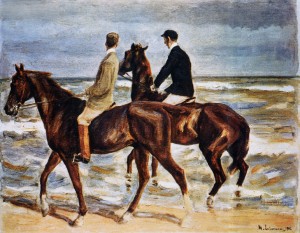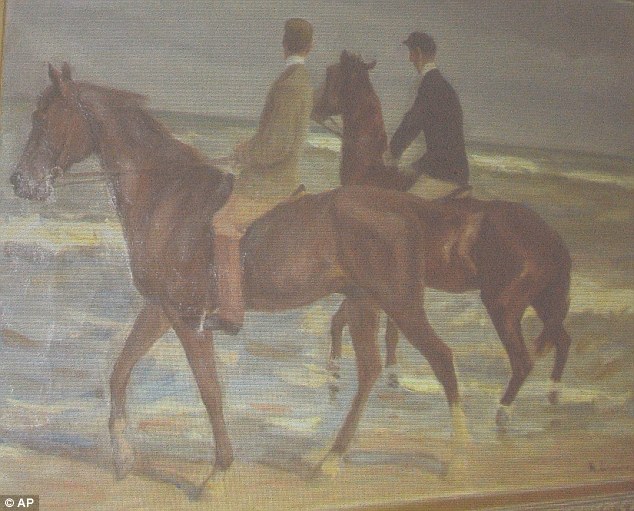Two weeks ago, the Federal Republic of Germany and Bavaria moved to dismiss the restitution claims brought by David Toren over ownership of Two Riders on the Beach (Zwei Ritter am Strand) by the German painter Max Liebermann. Toren’s uncle David Friedmann owned the painting in Breslau before he was targeted for his collection and it was stolen. Toren had not seen it since adolescence. The painting is further notable for two (related) reasons: it is among the 1,280 works of art found in Cornelius Gurlitt’s apartment in 2012, and it is one of only two that the Gurlitt Task Force has recommended be restituted (to Toren). As we noted at the time of the motion, Germany’s tactics seemed odd; Bavaria has committed to complying with the Task Force’s recommendations, and contesting this case seems to make little sense. The likeliest reason, in our view, is to try to make some jurisdictional law that will weaken other potential claimants to the Gurlitt trove.
Toren Amends Complaint Against Bavaria Over Liebermann Seized from Gurlitt, Spotlights Task Force Recommendation of Restitution in Support of Bailment Theory
Topics: Schwabinger Kunstfund, Hildebrand Gurlitt, Cornelius Gurlitt, Breslau, Max Liebermann, Germany, Silesia, Gurlitt Collection, Foreign Sovereign Immunities Act, bailment, Entartete Kunst, FSIA, Restitution, Bavaria, David Toren, Zwei Ritter am Strand, Free State of Bavaria, 28 U.S.C. § 1605(a)(2), Looted Art, World War II, Foreign Sovereign Immunities, Altmann v. Republic of Austria, Freistaat Bayern, Kunstmuseum Bern, Riders on the Beach, Federal Republic of Germany, Raubkunst, David Friedmann, Münchner Kunstfund
Bavaria and Germany Move to Dismiss Gurlitt Litigation, But Raise Questions About Why They Are Resisting a Lawsuit Over Painting that Task Force Recommended They Restitute to David Toren
To date, only one lawsuit has been filed in the United States related to the seizure from Cornelius Gurlitt’s apartment of some 1,280 works of art, a story that broke a year ago with the concern about the objects’ Nazi-looting connections via his father Hildebrand Gurlitt (the view here last winter was that the longer Germany failed to address the situation comprehensively, the more likely such U.S. litigation became). That lawsuit, brought by David Toren, seeks the return of Two Riders on the Beach (Zwei Ritter am Strand), by Max Liebermann. Germany and Bavaria moved to dismiss the case yesterday, which is particularly puzzling given that among the very few determinations made by the Gurlitt Task Force (in August), it is that the Liebermann should be returned. The cynical view is that they are looking to forestall future claims, but it is past time for the painting to be returned.
Topics: Schwabinger Kunstfund, Hildebrand Gurlitt, Cornelius Gurlitt, Breslau, Max Liebermann, Germany, Silesia, Gurlitt Collection, Foreign Sovereign Immunities Act, bailment, Entartete Kunst, FSIA, Restitution, Bavaria, David Toren, Zwei Ritter am Meer, Free State of Bavaria, 28 U.S.C. § 1605(a)(2), Looted Art, World War II, Altmann v. Republic of Austria, Freistaat Bayern, Kunstmuseum Bern, Riders on the Beach, Federal Republic of Germany, Raubkunst, David Friedmann, Münchner Kunstfund
Gurlitt Task Force Issues Second Public Recommendation, Urges Restitution of Liebermann painting to David Toren—Lawsuit Not Over Yet
Eileen Kinsella at ArtNet news reported today that the Gurlitt Taskforce has recommended the restitution of the Max Liebermann painting Riders on the Beach (Reiter am Strand) to David Toren, a New York man who left Germany at age 14 in 1939. His great uncle David Friedmann lived in Breslau, the capital of Silesia (now part of Poland, known as Wrocław). The Nazis catalogued and seized Friedmann’s art collection in 1939-40, and the Liebermann painting appears on those records. It was later found among those 1,280 objects seized from Gurlitt a little over two years ago when he aroused suspicion returning from Switzerland with a large amount of cash.
Topics: Breslau, Eileen Kinsella, Wrocław, Gurlitt Task Force, Max Liebermann, Silesia, Nazi-looted art, Gurlitt Collection, Entartete Kunst, Reiter am Strand, August Matteis, Restitution, David Toren, 28 U.S.C. § 1605(a)(2), World War II, Switzerland, degenerate art, Poland, Altmann v. Republic of Austria, Kunstmuseum Bern, www.lostart.de, Berner Zeitung, Riders on the Beach, David Friedmann, ArtNet news
Foreign Cultural Exchange Jurisdictional Immunity Clarification Act Reintroduced in House of Representatives, Would Ban Use of Exhibition Loan as Basis for Federal Court Jurisdiction
Steve Chabot (R-OH) has reintroduced the Foreign Cultural Exchange Jurisdictional Immunity Clarification Act (H.R. 4292), after a previous attempt to amend the Foreign Sovereign Immunities Act with regard to the loan of cultural objects failed to become law in 2012. The text of the March 25, 2014 bill is identical to the version that passed in the House in 2012. Its co-sponsors are John Conyers (D-MI) and Bob Goodlatte (R-VA), and it has been referred to the House Judiciary Committee.
Topics: Cornelius Gurlitt, Malewicz v. City of Amsterdam, Girolamo Romano, Gurlitt Collection, 22 U.S.C. § 2459, Christ Carrying the Cross Dragged by a Rogue, 517 F.Supp.2d 322, FSIA, Restitution, David Toren, 19 U.S.C. § 1595a, Steve Chabot, Orrin Hatch, House Judiciary Committee, 28 U.S.C. § 1605(a)(2), 28 U.S.C. § 1605(a)(3), Senate Bill 2212, World War II, IFSA, Foreign Sovereign Immunities, Altmann v. Republic of Austria, Portrait of Wally, John Conyers, Immunity from Seizure Act, Dianne Feinstein Foreign Sovereign Immunities Act, Federal Republic of Germany, 28 U.S.C. § 1605, H.R. 4292, Foreign Cultural Exchange Jurisdictional Immunity
DC Circuit Reinstates All Claims that Were Dismissed in Herzog Case Against Hungary-UPDATED
The DC Circuit Court of Appeals has reinstated the entire set of claims brought by the Herzog heirs against the Hungarian National Gallery, the Budapest Museum of Fine Arts, the Museum of Applied Arts, and the Budapest University of Technology and Economics. The appellate decision focuses on the claim that an agreement was reached after WWII to hold the paintings for their owners, not the claims relating to their wartime fate. In so doing, the court pushed to the side a whole range of defenses for sovereign defendants that have been increasingly successful. The court also reinstated claims to ownership of 11 works whose title was previously litigated, in an opinion that sets a low bar for collateral attacks on foreign judgments.
Topics: David de Csepel, Nazi Germany, Angela Maria Herzog, Hungary, WWII, Viktor Orban, res judicata, Julia Alice Herzog, Budapest University of Technology and Economics, Baron Mor Lipot Herzog, Hungarian National Gallery, Jori Finkel, Budapest Museum of Fine Arts, Adolf Eichmann, FSIA, expropriation exception”, Restitution, 28 U.S.C. § 1605(a)(2), 28 U.S.C. § 1605(a)(3), World War II, Foreign Sovereign Immunities, Alison Frankel, András Herzog, Janos Lazar, Museum of Applied Arts




